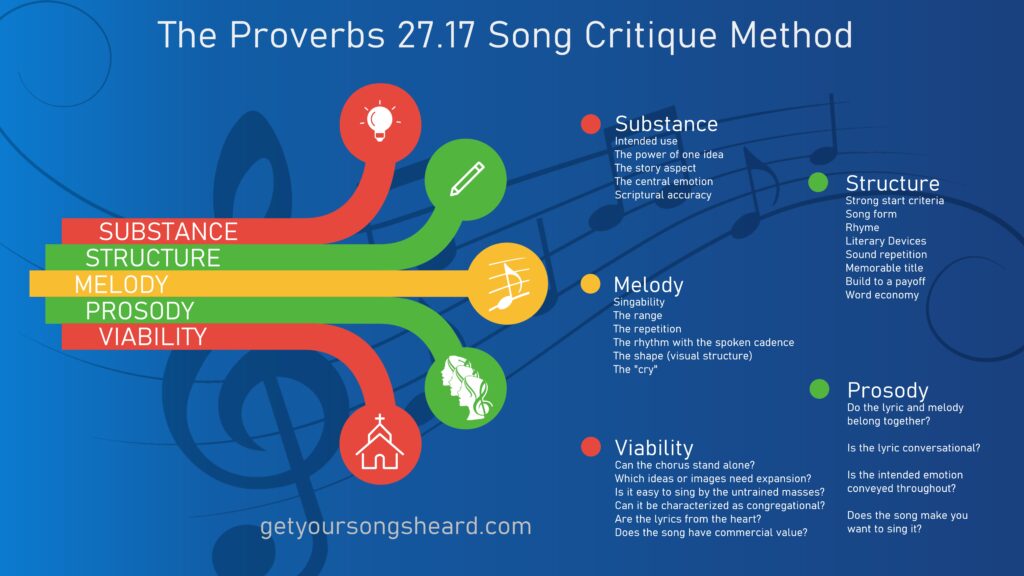
Download the pdf version of this graphic.
The art of the song critique
One of the best feedback tools is learning the art of the critique. It is equally important to learn how to give a critique as it is to receive one. Embracing this art is invaluable for rewriting your best work. Seeking feedback from a trusted source and using feedback are the best ways to improve as a writer, and both are instrumental in learning to spot writing inconsistencies. When your songs are critiqued, you don’t have to make all the changes suggested, you need to listen to the critique without taking offense—and only incorporate the changes that make sense to you … as you realize the suggestions improve the song.
No doubt about it. Our songs are our “babies”, and we think: “You’re gonna attack my baby?!” When I give a critique I say, “This is just my two cents. Take whatever suggestions ring true to your heart and leave the rest.” I want them to know my evaluation of the song is clinical. I will also be sure to include praise for what the song does best, in my opinion.
Learn to take suggestions and ask for clarifications. In the end, you’ll need a “thicker skin” to mold and craft songs that will stand out from the crowd. This is all part of maturing in the art.
Types of critiquing
Do you remember the old saying: You have to learn to crawl before you can learn to walk? Here, learning to crawl means to learn how song critique works so you know how to receive it and learn from it. You should learn how to combine the best from “give” and “take”, for they are inseparable. As babies, our legs and motor skills strengthened as we grew, learned to stand and then to walk—but we fell a lot in the effort to get on our feet.
In the songwriting arena, we get to our feet by getting feedback on our songs. Receiving feedback runs the entire gamut of emotion, from getting praise from family and friends to hearing suggestions from a critic you perceive as tearing you apart as a person. However, getting only pats on the back or being unprepared to discern constructive criticism won’t show you how to get on your feet and become a better writer.
One of the best articles I’ve seen on waking our minds up to this: Ten Things Your Mother Won’t Tell You About Your Songwriting at https://songs4god.net/ten-things-your-mother-wont-tell-you-about-your-songwriting/.
Some writers have figured out how to receive critique, but not give it. They only pass on encouragement when critiquing, but do not offer specific suggestions for improvements. Such encouragement from experienced writers is valuable, but not necessarily constructive. You need feedback designed to help you get on your feet, take your song to the finish line, and show you how to be a better writer.
If you want to become a dedicated congregational songwriter, “cut to the chase” and take on serious critique. (pull quote) Learn from the critique. Focus the learning and become a better writer so you can cross that finish line.
You need constant feedback dedicated to your growth. Top-level critique will speed up your learning curve in remarkable fashion to help you create a top-tier song.
But where do you find this information? Is there a single source of information designed to critique and build congregational worship songs?
Yes.
It’s right here in the following paragraphs. My intention is to help you learn the art of song critique and harness the power it will have on your writing. This upcoming exercise will speed up the learning curve.
Learn how to take data and turn that into information, information into knowledge, and knowledge into wisdom.
Neil deGrasse Tyson
To do this, I’ll show you how to take extensive data from a song questionnaire and turn that into information. Each individual on a critique team rates and gives comment for each area (this makes the critique team really dig into the lyric and the music). The completed questionnaire is then given to the songwriter so they can take the information and improve the song. Or ignore it. Hey, it’s their song, they get to choose.
Purposeful critiquing using The Proverbs 27.17 Song Critique Method
This is a next-level tool. It’s a method to assess your songs and to learn crafting through purposeful critiquing. The design takes advantage of group learning. It is focused on writing for congregations to accelerate the learning curve and sharpen core writing skills.
The definition of congregational songwriting is found in this list. You’ll find questions there not in the above list in the full form, which is found in my book Fishing in Church. It seeks extensive information about the song by asking follow-up questions to those in this list.
For more information, please visit https://getyoursongsheard.com

